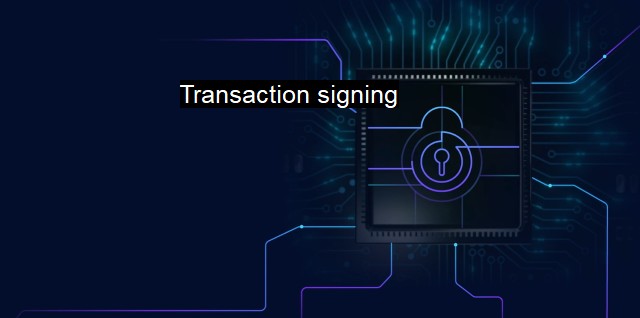What is Transaction signing?
The Importance of Transaction Signing for Cybersecurity: A Look into Digital Signatures and Online Transactions
Transaction signing, which finds extensive application in various contexts such as online payments, e-commerce, cryptocurrency transactions, digital contracts, and more, is outlined in this essay. Basically, with respect to cybersecurity and antivirus systems, transaction signing is an essential method employed to confirm the authenticity and integrity of transactions, primarily in the online space.At its core, transaction signing is a technique where a user applies their unique digital signature to a certain document, file or transaction, thus marking it as valid and authentic. Digital signatures are unique to each user and are nearly impossible to forge, which gives transaction signing a high degree of security competence. The core working principle of transaction signing involves the use of two keys - a private key known only to the user to sign the transaction, and a public key for anyone to verify the signature. Importantly, these two together form a strong and secure binding, enhancing the security measures in cyberspace.
Transaction signing serves as an important function in online transactions, especially where sensitive and confidential data are involved. By leveraging transaction signing, businesses can ensure that their online transactions aren't exposed to unauthorized access, cyber threats, or potential data tampering activities. It must be pointed out, in the same thread of thought, that an antivirus solution verifies each transaction signing process, monitoring these activities to ensure a secure and safe transaction pathway.
Given the heightened era of cyber threats, it's easy to underestimate the protective shield provided by transaction signing needs. an effective digital signature can offer unrelenting security against potential malicious actors. When property update requests or transactions prove to be coming from trusted sources as indicated by a specific signature, a sense of credibility is maintained. Noteworthy too is the additional sense of trust provided to data exchange among sectors - between governments and businesses, and between businesses themselves through B2B transactions.
In blockchain transactions and the sphere of cryptocurrency, transaction signing is even more crucial. Due to the decentralized nature of blockchain technologies, transaction signing aids in establishing a trust-less ecosystem. Verified signatures act as indisputable evidence that the transaction was signed by the owner of the wallet and ensures that the data, once entered into the blockchain, is immutable - unable to be altered or deleted. Safeguarding these digital currencies through transaction signing also restricts any form of unauthorized double-spending.
When implemented alongside a robust antivirus and cybersecurity solution, transaction signing creates a formidable barrier against the legion of cyber threats. With malware often trying to manipulate transactions or steal sensitive information, antivirus software diligently works to detect these malicious actions. During the transaction signing process, should any malicious intrusion be noted, the antivirus software generates an immediate security alert enabling prompt, protective counter-actions.
Transaction signing is not a panacea, impervious to all forms of threats. Still, it significantly enhances security during digital transactions, due to its inherent encrypting capability. When we consider this, alongside compulsory security measures such as regular software and antivirus updates, allegiance to a stringent cybersecurity protocol, and cyber-hygiene practices, the successful thwarting of breaches becomes ever more plausible. Such secure transaction signing rights might be enough to dissuade potential cyber attackers or, at least, may give them serious reasons to reconsider their hacking strategies.
As an essential asset in online business activity today, transaction signing encapsulates the heightened importance of cybersecurity in the digital age. By facilitating a secure platform to conduct online transactions and assure data integrity, transaction signing continues to foster credibility, trust, and sustenance between all online stakeholders. It is a pivotal decider of the security threshold of online activities, allowing worry-free online business transactions, e-commerce maintenance, and secure data sharing among organizations.

Transaction signing FAQs
What is transaction signing in cybersecurity?
Transaction signing is a process of verifying and authenticating a digital transaction using a cryptographic signature. It helps to ensure that the transaction is legitimate and has not been tampered with during transmission.Why is transaction signing important in antivirus software?
Transaction signing is important in antivirus software as it helps to identify and prevent malware from executing malicious transactions on a system. It verifies the authenticity of the transaction, making it difficult for hackers to manipulate or exploit the system.What are the benefits of using transaction signing in cybersecurity?
Some of the benefits of using transaction signing in cybersecurity are: 1. It establishes trust and authenticity in digital transactions. 2. It helps to prevent fraud and cyber attacks. 3. It enhances data privacy and confidentiality. 4. It provides a secure and reliable way to verify the integrity of transactions.How does transaction signing work in antivirus software?
Transaction signing in antivirus software works by generating a unique digital signature for each transaction. This signature is created using a private key that is only accessible to the sender. The signature is then verified by the recipient using a public key, which ensures that the transaction is authentic and has not been tampered with.| | A | | | B | | | C | | | D | | | E | | | F | | | G | | | H | | | I | | | J | | | K | | | L | | | M | |
| | N | | | O | | | P | | | Q | | | R | | | S | | | T | | | U | | | V | | | W | | | X | | | Y | | | Z | |
| | 1 | | | 2 | | | 3 | | | 4 | | | 7 | | | 8 | | |||||||